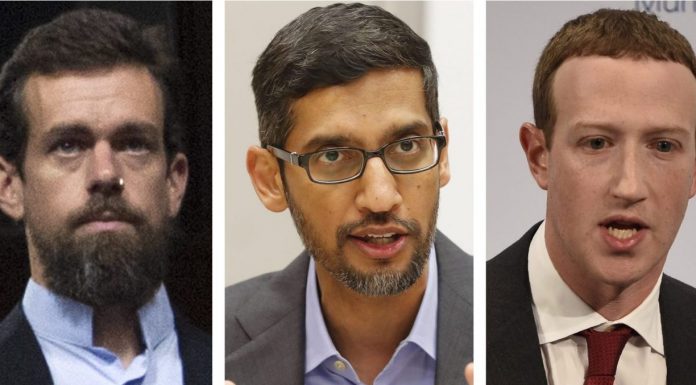(Headline USA) Less than a week before Election Day, the CEOs of Twitter, Facebook and Google are set to face a grilling over their blatant suppression of conservative media during a bombshell scandal involving Democrat presidential hopeful Joe Biden.
The Senate Commerce Committee has summoned Twitter CEO Jack Dorsey, Facebook’s Mark Zuckerberg and Google’s Sundar Pichai to testify for a hearing Wednesday. The executives have agreed to appear remotely after being threatened with subpoenas.
The companies’ already outrageous censorship efforts reached unprecedented levels after they blocked the spread of a New York Post story that contained damning revelations from the abandoned laptop of Joe Biden’s son Hunter.
While allegations of corruption involving foreign governments, drug abuse and sexual misconduct with underage girls have long plagued the Bidens, the laptop’s files appeared to corroborate them.
The veracity of some of the emails has since been confirmed by one of Hunter Biden’s former business partners, Tony Bobulinski, whose name appears in emails about a joint equity venture with one of China’s top energy companies.
Joe Biden has said he would limit—if not ban outright—US fossil fuels production, even as his son and brother James undertook multiple deals to profit from foreign companies, including Burisma, the corrupt Ukrainian company at the center of House Democrats’ push last year to impeach President Donald Trump.
Trump, asked by reporters about the companies Tuesday as he left Washington for the campaign trail, said they are trying to suppress revelations of Joe Biden’s “corruption.”
“They don’t want to show corruption, like you have with Biden. That’s totally corruption, and everybody knows it,” Trump said. “It’s very unfair. Nobody has ever seen anything like this. It’s not freedom of the press, it’s the opposite.”
Social media giants are also under heavy scrutiny for their efforts to police misinformation about the election, which in turn may have enabled the Biden campaign’s efforts to falsely portray politically damaging facts as part of a Russian election-meddling plot.
Twitter and Facebook have slapped a misinformation label on content from the president, who has around 80 million followers. Trump has raised the prospect, amid growing mounds of documented evidence, of mass fraud in the vote-by-mail process.
Starting Tuesday, Facebook says it is not accepting any new political advertising. That appears to be targeted toward undermining the Trump campaign should the outcome of the election remain contested or uncertain.
Several blue states have sought to delay the deadlines for collecting and counting absentee ballots until after Election Day, when they know how many they will need to overturn a possible Trump victory.
Google, which owns YouTube, also is halting political ads after the polls close. Twitter banned all political ads last year.
The companies have hinted at possibly freezing out the accounts of Trump and other officials in the event that they try to contest the outcome, although none have suggested they would do so for Biden.
Beyond questioning the CEOs, senators will examine proposals to revise long-held legal protections for online speech, an immunity that critics in both parties say enables the companies to abdicate their responsibility to impartially moderate content.
The Trump administration’s Justice Department has asked Congress to strip some of the bedrock protections that have generally shielded the tech companies from legal responsibility for what people post on their platforms.
Trump signed an executive order this year challenging the protections from lawsuits under a 1996 telecommunications law. A provision known as Section 230 has served as the foundation for unfettered speech on the internet.
“For too long, social media platforms have hidden behind Section 230 protections to censor content that deviates from their beliefs,” Sen. Roger Wicker, R-Miss., the committee chairman, said recently.
The head of the Federal Communications Commission, an independent agency, recently announced plans to reexamine the legal protections, potentially putting meat on the bones of Trump’s order by opening the way to new rules.
The move by FCC Chairman Ajit Pai, a Trump appointee, marked an about-face from the agency’s previous position during the Obama administration.
The unwelcome attention to the three companies piles onto the anxieties in the tech industry, which also faces scrutiny from the Justice Department, federal regulators, Congress and state attorneys general around the country.
Last week, the Justice Department sued Google for abusing its dominance in online search and advertising—the government’s most significant attempt to protect competition since its groundbreaking case against Microsoft more than 20 years ago.
With antitrust in the spotlight, Facebook, Apple and Amazon also are under investigation at the Justice Department and the Federal Trade Commission.
Democrats, meanwhile, hope to use the hearing to call attention to the companies’ exploitation of local news outlets.
Critics say their dominant position in the advertising market has crushed the struggling U.S. news industry, especially local publishers.
About 7,000 newspaper employees are expected to be laid off this year, and newspaper revenues will be down 70% from two decades ago, according to a report issued Tuesday by the committee’s Democratic staff.
“Local news is an incredible engine for the creation of accurate information. We don’t want to lose that infrastructure,” Sen. Maria Cantwell of Washington state, the panel’s top Democrat, said in an interview.
The Democrats’ report accuses the big platforms of unfairly using news content, taking news consumers’ data and diverting customers from local news websites, with little compensation.
It proposes that Congress enact rules preventing tech platforms from taking local news content without fair payment.
“These unfair and abusive practices should be called out,” Cantwell said.
Adapted from reporting by the Associated Press

